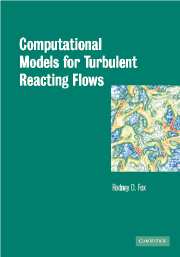Book contents
- Frontmatter
- Contents
- Preface
- 1 Turbulent reacting flows
- 2 Statistical description of turbulent flow
- 3 Statistical description of turbulent mixing
- 4 Models for turbulent transport
- 5 Closures for the chemical source term
- 6 PDF methods for turbulent reacting flows
- 7 Transported PDF simulations
- Appendix A Derivation of the SR model
- Appendix B Direct quadrature method of moments
- References
- Index
1 - Turbulent reacting flows
Published online by Cambridge University Press: 07 December 2009
- Frontmatter
- Contents
- Preface
- 1 Turbulent reacting flows
- 2 Statistical description of turbulent flow
- 3 Statistical description of turbulent mixing
- 4 Models for turbulent transport
- 5 Closures for the chemical source term
- 6 PDF methods for turbulent reacting flows
- 7 Transported PDF simulations
- Appendix A Derivation of the SR model
- Appendix B Direct quadrature method of moments
- References
- Index
Summary
Introduction
At first glance, to the uninitiated the subject of turbulent reacting flows would appear to be relatively simple. Indeed, the basic governing principles can be reduced to a statement of conservation of chemical species and energy ((1.28), p. 16) and a statement of conservation of fluid momentum ((1.27), p. 16). However, anyone who has attempted to master this subject will tell you that it is in fact quite complicated. On the one hand, in order to understand how the fluid flow affects the chemistry, one must have an excellent understanding of turbulent flows and of turbulent mixing. On the other hand, given its paramount importance in the determination of the types and quantities of chemical species formed, an equally good understanding of chemistry is required. Even a cursory review of the literature in any of these areas will quickly reveal the complexity of the task. Indeed, given the enormous research production in these areas during the twentieth century, it would be safe to conclude that no one could simultaneously master all aspects of turbulence, mixing, and chemistry.
Notwithstanding the intellectual challenges posed by the subject, the main impetus behind the development of computational models for turbulent reacting flows has been the increasing awareness of the impact of such flows on the environment. For example, incomplete combustion of hydrocarbons in internal combustion engines is a major source of air pollution. Likewise, in the chemical process and pharmaceutical industries, inadequate control of product yields and selectivities can produce a host of undesirable byproducts.
- Type
- Chapter
- Information
- Computational Models for Turbulent Reacting Flows , pp. 1 - 26Publisher: Cambridge University PressPrint publication year: 2003
- 1
- Cited by



